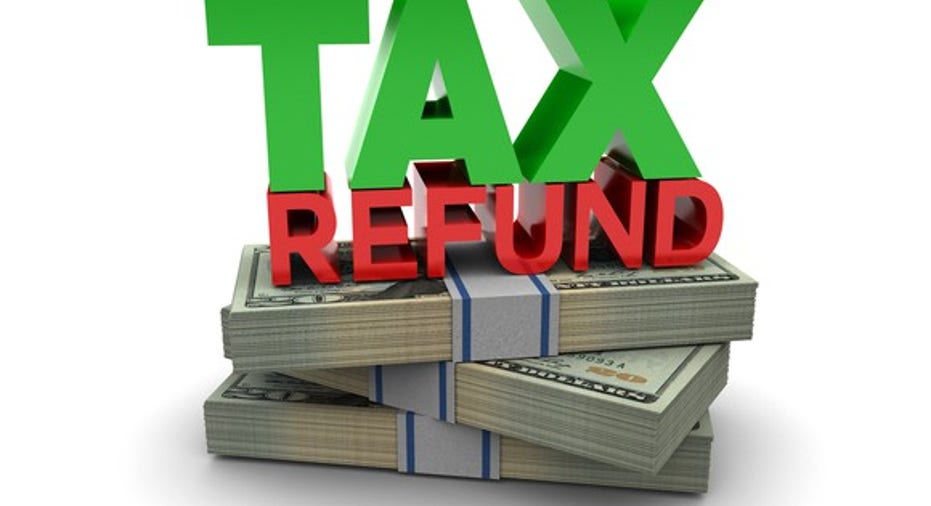Here's How Almost One-Third of Americans Plan to Use Their Tax Refunds - and Why it's a Major Problem

If you're among the countless Americans who will receive a tax refund this year, you're not alone. More than 70% of taxpayers got cash back from the IRS last year, with an average refund of $2,860 across all filers. And while some people are wise enough to recognize that getting a refund is actually a bad thing, as it means having lent the U.S. government money throughout the year, a large number of Americans still look at that cash as free money when it eventually comes their way.
Here's the problem, though: Nearly half of the U.S. population lives paycheck to paycheck. When asked if they could cover a $400 emergency on the spot, 47% of workers admitted they'd be in a major bind and would either need to put that bill on a credit card, borrow the money, or sell something to come up with the cash.
IMAGE SOURCE: GETTY IMAGES.
What do tax refunds have to do with this trend? It's simple. When you overpay your taxes during the year, and you don't have any savings, you leave yourself even more vulnerable in the face of a financial emergency. Not only that, but you create a situation where you might struggle just to cover your basic expenses. In fact, according to a recent Bankrate study, 29% of those who are getting refunds this year say they'll use that money to pay for basic necessities, like food and toiletries. And that speaks volumes about the dangers of not having access to that cash initially.
What can that extra money do for you?
Many people overpay their taxes during the year simply to avoid the opposite scenario of owing money come tax time. But in doing so, they're causing themselves unnecessary financial stress -- especially when you consider the size of the average taxpayer's refund last year.
It's one thing to part with an extra couple of hundred dollars over the course of the year. In fact, if you get a $200-$400 refund, it means you did a much better job than most people of estimating how much tax to pay. But when we talk about getting close to $3,000 back from the IRS in one lump sum, it sheds serious light on the fact that countless Americans are depriving themselves of essential income up front.
Let's look at that number more closely. Getting a $2,860 refund means losing out on $238 of income per month. That's a game-changer for someone living paycheck-to-paycheck. Now let's assume you're among the 47% of Americans who couldn't cover a $400 expense at a moment's notice. If you were to put an extra $238 back into each month's paychecks, you'd certainly get a lot closer.
Furthermore, having additional cash in each paycheck could help you avoid costly credit card debt. Imagine you need to put a $700 auto repair on your credit card, and that it takes you a year to pay it off at 20% interest. By the time that debt is wiped out, you'll have thrown away roughly $80 in interest charges. On the other hand, if you were to collect an extra $238 each month, you'd be able to pay off that bill in just three months' time, thereby cutting your interest charges to just $23. And while $57 in savings may not seem like a lot, when you're living paycheck-to-paycheck, it's huge.
Getting paid up front, as opposed to in the form of a tax refund, can also help you safeguard or improve your credit score. The more cash you have available to pay your bills along the way, the more likely you are to meet your minimum payment requirements, thus building your credit and making it more affordable to borrow when you need to.
Even if you aren't among the nearly 50% of workers who need every cent they earn to cover their basic necessities, you can still benefit from getting more of your money as you go along. You can use that cash to invest, fund your retirement savings, or simply live life with a touch less financial stress. It's a much better alternative to granting the government an interest-free loan and getting absolutely nothing in return.
A simple fix
If you're tired of cheating yourself out of all that money when you need it, the best way to address the problem is to adjust your withholding on your W-4 so that you're claiming more allowances and having less tax taken out per paycheck. You're typically allowed to change your W-4 as frequently as you wish, so don't be shy about making tweaks. Keep in mind, however, that it often takes a couple of payroll cycles to implement W-4 adjustments, so the sooner you act, the more cash you'll have access to as you earn it.
The $16,122 Social Security bonus most retirees completely overlook If you're like most Americans, you're a few years (or more) behind on your retirement savings. But a handful of little-known "Social Security secrets" could help ensure a boost in your retirement income. For example: one easy trick could pay you as much as $16,122 more... each year! Once you learn how to maximize your Social Security benefits, we think you could retire confidently with the peace of mind we're all after.Simply click here to discover how to learn more about these strategies.
The Motley Fool has a disclosure policy.



















